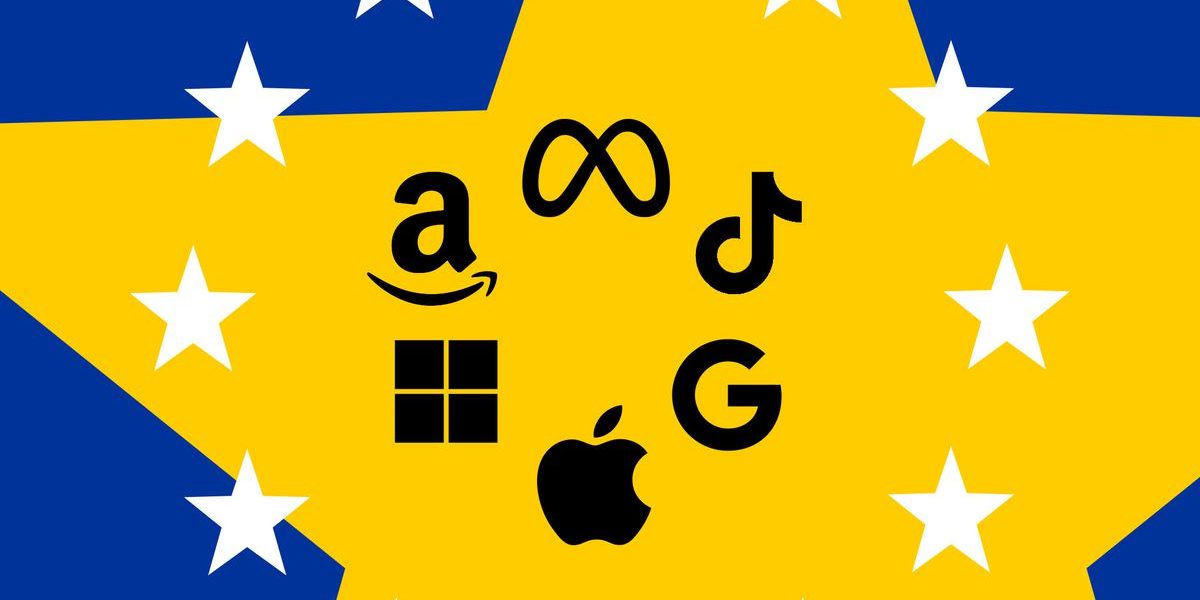DMA Rules and the Power of Google, Google, Amazon, Meta, and Alphabet: An EU-Scale View on Their Compliance with the European Commission
Companies like Amazon, Meta, and Google, rather than appealing their designation, have simply announced changes in response to the DMA. The announcements point toward superficial compliance that is designed to tick regulatory boxes, without posing a real threat to the market dominance.
The European Commission presumes a platform is a gatekeeper if it meets two conditions. First, it must have an annual EU revenue of at least €7.5 billion in each of the last three fiscal years or an average market cap of €75 billion in the last fiscal year, while providing its core platform to at least three EU member states. Second, it must operate a core platform with at least 45 million monthly active users in the EU and more than 10,000 yearly active EU business users in each of the last three fiscal years.
The commission identified specific services for each of the designated gatekeepers that it believes are subject to DMA rules. Gatekeepers that fail to comply with the rules can face fines of up to 10 percent of global revenue, and up to 20 percent for repeat infractions.
Alphabet has a sprawling empire, stretching from a dominant search engine to a major web browser and popular mobile operating system, with many services interlinked to augment their power. It has the widest range of services under the DMA.
In January and March the company announced a variety of changes, including datasharing and search results for EU users. The highlights include:
The company has been a target of EU antitrust attacks for a long time. The choice screens for search engines on the Chrome browser are a result of a previous legal spat.
According to Penfrat, Apple is the gatekeeper that could be hit hardest by the DMA, since there are already several competitors in a position to challenge Apple’s app store dominance, including Spotify and Epic. Apple makes a lot of money with its app store monopoly over 85 billion dollars a year, their particular resistance to meaningful change.
The changes set to be introduced for EU residents with iOS 17.4 technically comply with DMA rules, but they come with new conditions that are onerous for developers. Apple’s commission on apps hosted on third-party app stores will be reduced to 0.50 by the incoming policies. “Core Technology Fee” if they reach over a million downloads — with the only alternative being to stick with the company’s original 15–30 percent commission rate.
Penfrat went as far as to call these changes “malicious,” saying they could actually make matters much worse for developers trying to get away from Apple’s app store monopoly. “Under the current Apple proposal, it seems unlikely anyone would even attempt to challenge the gatekeeper’s monopoly. It’s simply not worth it. The EU Commission will lose the DMA if they allow this to pass.
Given that, companies haven’t exactly lined up to accept Apple’s offer. A handful of third-party app marketplaces have been announced by Epic, MacPaw, and Mobivention, but only the latter claims it’ll be available for iOS users on March 7th, right after the DMA takes effect. Similarly, while rival web browser providers like Google and Mozilla are seemingly experimenting with new iOS browsers, neither company has officially announced when those apps will be available.
Meta has a long history of taking on other businesses such as messaging services and an ad platform. The services that are covered by the DMA are concentrated in certain areas.
Meta launched a 9 per month ad-free tier for Facebook and Instagram last year in order to address concerns about targeting ads, and as of March 1st, it was available for all users. An additional fee is charged for linked accounts. It also paused ads for users younger than 18, although its long-term plans there are less clear.
The choice to lean on a paid option resulted in a lawsuit from the European Consumer Organisation (BEUC), which claimed the “very high subscription fee” meant users “do not have a real choice.” In January, Meta introduced a number of other data protection features, including the ability to separate Facebook and Instagram accounts and sever linked ones.
But the most exciting change for many people is the prospect of third-party cross-platform messaging, which Meta announced for its WhatsApp service last year. As the Diamp comes in, we should expect more details on what this third-party messaging support will look like.
These changes are in the works despite Meta appealing some pieces of its gatekeeper designation. In November, it argued that Messenger and Marketplace were not included on the list due to being consumer-to-consumer services. As of this week’s deadline, the challenge remains ongoing.
The EU’s new competition rules are going live — here’s how tech giants are responding: What Amazon is doing to foster competition under the DMA
What Amazon hasn’t detailed yet, though, is what kind of changes — if any — it’s making to ensure its marketplace fosters competition under the DMA. The rules could mean the company can’t give its brands preferential treatment in search results or copy products from third-party sellers, both of which Amazon has been accused of in the past. Amazon has been accused of using seller data to get ahead of the competition in the EU, where it has been subject to antitrust scrutiny. The company settled these charges in 2022 and promised to stop using non-public data, as well as make it easier for more sellers to appear within its “Featured Offer” box (formerly called the “Buy Box”), where products get high visibility.
Additionally, Amazon has committed to giving advertisers and publishers with campaigns in the EU “new, expanded reports” that they can access from Amazon’s website. These reports give more information on how much an advertiser is paying and how much a publisher is getting from advertising on a website or app. The company is also rolling out a new “clean room” for advertisers with campaigns in the EU, allowing them to “independently verify the success and impact of their campaigns in a privacy-safe, cloud-based environment.”
Microsoft’s Windows operating system falls under the DMA’s regulations, and that’s changing how much the company promotes — or lets users avoid — numerous other apps and services inside it.
The changes have already been put into machines in the European Economic Area, so Microsoft is ready for compliance day. We’re now waiting to see if Google decides to release its own add-in for Google search results in the Windows Search interface. There could potentially be a number of Windows Widgets providers soon, too.
Source: The EU’s new competition rules are going live — here’s how tech giants are responding
How Did ByteDance Get Listed in the European Mobile World? The European Commission’s High-Dimensions Case against Electronic Gatekeepers
The political significance of ByteDance is clear, cutting against the arguments of some critics that the EU is unfairly targeting American companies. (A second non-US-based company, Samsung, was initially named but later removed from the gatekeeper list.) A California Democrat on the House Judiciary subcommittee on antitrust was among more than 20 bipartisan colleagues who signed a letter last year complaining of the targeting of U.S. companies by EU policies. The lawmakers critiqued the fact that the European Commission didn’t name Chinese firms like Huawei, Tencent, and Alibaba gatekeepers “despite the fact that they are competing aggressively with U.S. firms in the EU and other markets.”
ByteDance shared about how TikTok will comply with the DMA. The platform launched an API that will let European users transfer their data to other apps that have registered with TikTok to use the tool. Users can grant permission for registered developers to port activity from TikTok to their own apps. TikTok improved its download your data tool, which allows individual users to export and download their data. It will have better data transfer solutions for business accounts.
The EU court shot down the company’s request to change its designation after they found no risk of harm for TikTok.
The European Commission has to approve all the proposals that were submitted by the DMA. An EU commissioner told a news agency in January that if they feel the solutions being proposed aren’t good enough, they would take strong action.
That makes it difficult to gauge how much consumers and smaller competitors actually stand to gain. The senior policy advisor at European Digital Rights said that no significant changes have been made to the power structures that keep companies at the top. It is possible that removing apps from your mobile device might help smaller providers, though that remains to be seen.
That might be fine for apps with a limited number of users, but those fees can add up quickly if they become victims of their own success. David Heinemeier Hansson, creator of Ruby on Rails, believes Meta would have to pay Apple around $135 million per year to host just one photo-sharing service on its app store.
Reconciling iOS and Safari with the EU: Progressive Web Apps won’t be viewed in the Firefox Browser Endivision
Apple previously decided to drop support for progressive web apps (PWAs) in the EU, going as far as to blame the DMA. After facing a potential investigation from the EU, the company has walked back that decision. PWAs will continue to exist — though they’ll have to be built on WebKit, the engine used by Safari. As one of its responses to the DMA, Apple is allowing third-party browsers to use their own engines in iOS in the EU. But PWAs downloaded through those browsers will still be reliant on Safari’s WebKit.




